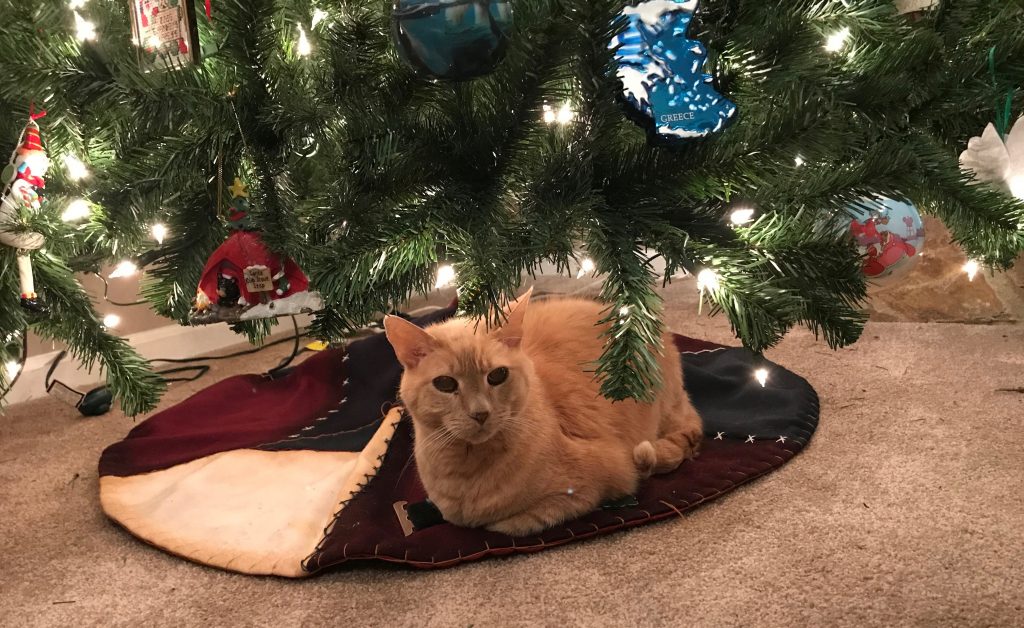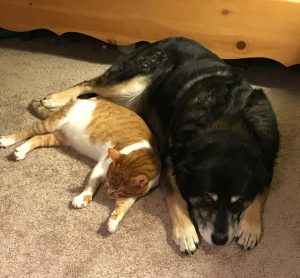
Care for Senior Pets
“Our society must make it right and possible for old people not to fear the young or be deserted by them, for the test of a civilization is the way that it cares for its helpless members.” — Pearl Buck, Pulitzer Prize Winning Author
The above quote is a perfect introduction to spotlight Dr. Beatrice McCabe, VMD. Although the quote references the way we treat fellow humans, the sentiment can be echoed in the manner in which we should care for our senior pets. Senior care management and hospice (palliative) care are topics near and dear to Dr. McCabe’s heart. Dr. McCabe is a graduate of the University of Pennsylvania School of Veterinary Medicine. Lucky for us, she has been working as an associate veterinarian at Longwood Veterinary Center since 2008.
Dr. McCabe has made conscious decisions to adopt older pets throughout her career as she realizes she is superbly qualified to give them excellent care in their senior years. In fact, she has even completed the AAHA Animal Hospice and Palliative Care course in order to enhance her understanding of this specialized period in a pet’s life. Below Dr. McCabe discusses two pets she recently opened her home to.
 “We chose to adopt a senior cat after our family dog passed away. LVC had a senior cat, ‘Jersey,’ from a shelter in its care. He required extensive dental attention due to years of neglect and untreated periodontal disease. He was such a sorry looking creature! Dr. Andrews convinced me that Jersey would be the one to heal our broken hearts, and she was right! Jersey not only recovered well but thrived for several years until he was diagnosed with intestinal cancer. I was able to develop a palliative care program for him, and he had a good quality of life for 18 months until it was time to let him go.
“We chose to adopt a senior cat after our family dog passed away. LVC had a senior cat, ‘Jersey,’ from a shelter in its care. He required extensive dental attention due to years of neglect and untreated periodontal disease. He was such a sorry looking creature! Dr. Andrews convinced me that Jersey would be the one to heal our broken hearts, and she was right! Jersey not only recovered well but thrived for several years until he was diagnosed with intestinal cancer. I was able to develop a palliative care program for him, and he had a good quality of life for 18 months until it was time to let him go.
Jersey was followed by ‘Big Guy,’ another senior cat in a very similar situation. He also came into our lives through our LVC/shelter program soon after Jersey passed away. He was a big and gruff buff cat with no teeth and plenty of attitude. At our home, Big Guy quickly learned how to love and be loved. We were able to give Big Guy a good life for the 2 years we had him.”
Dr. McCabe admits, “From my own personal experiences, I have learned a lot about developing a palliative care program for the senior pets I have adopted.” One easily overlooked part of the senior pet equation is the emotional needs of caretakers who sometimes struggle with losing a pet. Dr. McCabe is acutely aware of the importance of pet owners and the role they play in improving and extending a pet’s final years. She takes particular interest in addressing the physical, social, and emotional needs of our patients and their caregivers, in addition to the needs of the animals they care for.
“There is so much we can do to help our geriatric or terminally ill patients receive the best quality of life possible,” she said.
If you have any questions or concerns about your senior pet, please do not hesitate to call us. The support staff and veterinarians of Longwood Veterinary Center are always here to help.
